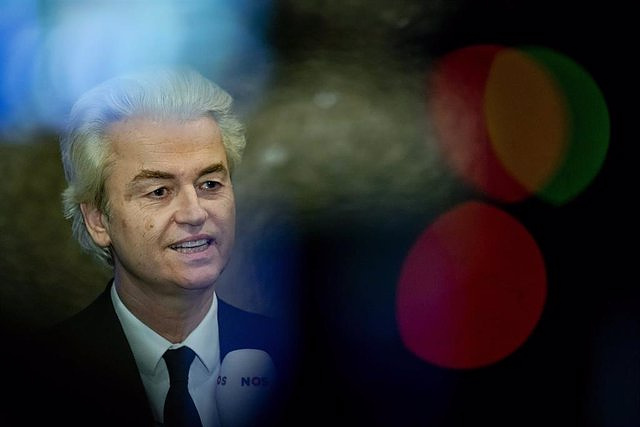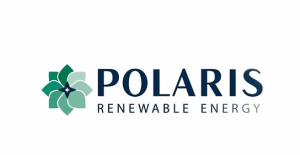The previous government took almost 280 days to form after long rounds of negotiations
MADRID, 23 Nov. (EUROPA PRESS) -
The surprise victory of the far-right Freedom Party (PVV) in the elections held on Wednesday in the Netherlands now puts Geert Wilders' party in the difficult situation of forming a government in a country with a highly fragmented politics.
The party, which has an anti-immigration and anti-Islam discourse, could become the party with the largest number of seats in the Dutch Parliament by taking 37 of the 150 deputies in the Lower House, which represents the largest political shift in the History of the country.
Although these results place them closer to the 76 seats required to win the majority, the PVV will need the help of other parties to obtain control of the government in a country with one of the most proportional and multi-party systems in the world.
"We are the party with the most votes in the Netherlands and I assure you that the voters have spoken," said Wilders himself after learning the first results of the elections. Thus, he has highlighted that citizens "will come first again" and has hinted that contacts with other parties have already begun. "We will govern," he assured.
In this sense, he pointed out that "the PVV wants to work with other parties from a great position, although the left-wing bloc led by the former vice president of the European Commission Frans Timmermans has already ruled out a pact with the far right after winning 25 seats. "I expected more," said Timmermans, who stressed that he continues to defend "the rule of law" before thanking his supporters.
Added to this is the New Social Contract (NSC) of the Christian Democrat Pieter Omtzigt, the main favorite in the voting intention polls, which has finally obtained 20 seats and which also ruled out working with Wilders, at least for the moment. According to Omtzigt, the results plunge the Netherlands into a "new era" on a political level, although he has admitted that the PVV's victory is a "huge shock."
The Dutch politician, a practicing Catholic, advocates for new leadership that includes the creation of a Constitutional Court and defends gay marriage, although he has not shown a clear position on access to abortion.
Dilan Yesilgoz, the candidate of the Popular Party for Freedom and Democracy (VVD) of the still acting Prime Minister, Mark Rutte, has not closed the door to a negotiation with the far-right leader after obtaining 24 seats and has been more forceful when it comes to taking measures against migration. "Now it is Wilders' turn and he must show that he can form a majority," she said.
Likewise, he has ruled out that his training has made any strategic error and has stated that the results respond to the "concerns of people who have not been heard." "If you keep ignoring them in policy you get this, and that's what's happening here," she said.
However, it is not clear whether the leader of the PVV will be able to carry out this coalition nor if the remaining left-wing parties will be able to put a viable solution on the table that avoids becoming a puzzle with a tendency to crack due to internal differences.
The deputies will have to be sworn in on December 6, and until a new government is formed, Rutte will continue to lead with the current Cabinet in a country where the previous Executive took almost 280 days to be formed after long rounds of negotiations.
Dutch politics has recently witnessed a drop in support for more traditional leaders and formations, which have been gradually losing votes in a trend that has become plausible in much of Europe.

 Exploring Cardano: Inner Workings and Advantages of this Cryptocurrency
Exploring Cardano: Inner Workings and Advantages of this Cryptocurrency Seville.- Economy.- Innova.- STSA inaugurates its new painting and sealing hangar in San Pablo, for 18 million
Seville.- Economy.- Innova.- STSA inaugurates its new painting and sealing hangar in San Pablo, for 18 million Innova.- More than 300 volunteers join the Andalucía Compromiso Digital network in one month to facilitate access to ICT
Innova.- More than 300 volunteers join the Andalucía Compromiso Digital network in one month to facilitate access to ICT Innova.-AMP.- Ayesa acquires 51% of Sadiel, which will create new technological engineering products and expand markets
Innova.-AMP.- Ayesa acquires 51% of Sadiel, which will create new technological engineering products and expand markets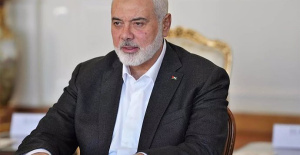 Hamas views Israel's latest deal proposal in "positive spirit"
Hamas views Israel's latest deal proposal in "positive spirit" The Ibex 35 rises 0.22% mid-session driven by Aena (4.66) and Sabadell (4.57%)
The Ibex 35 rises 0.22% mid-session driven by Aena (4.66) and Sabadell (4.57%)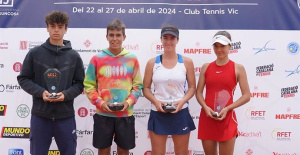 STATEMENT: Selena Romero and Roberto Pérez winners of the 22nd Nacho Juncosa Memorial - International under-16 tennis tournament
STATEMENT: Selena Romero and Roberto Pérez winners of the 22nd Nacho Juncosa Memorial - International under-16 tennis tournament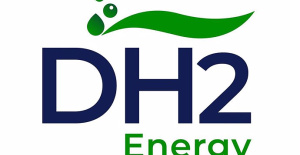 STATEMENT: DH2 Energy is the winner in the first European renewable hydrogen auction
STATEMENT: DH2 Energy is the winner in the first European renewable hydrogen auction How Blockchain in being used to shape the future
How Blockchain in being used to shape the future Not just BTC and ETH: Here Are Some More Interesting Coins Worth Focusing on
Not just BTC and ETH: Here Are Some More Interesting Coins Worth Focusing on UPV students design an app that helps improve the ventilation of homes in the face of high temperatures
UPV students design an app that helps improve the ventilation of homes in the face of high temperatures Ivace and promotes a less invasive device for the early detection of prostate cancer
Ivace and promotes a less invasive device for the early detection of prostate cancer Valencia unanimously approves the ordinance to allocate spaces to test innovative initiatives
Valencia unanimously approves the ordinance to allocate spaces to test innovative initiatives UPV researchers promote a paid master's degree as a "talent factory" in integrated photonics
UPV researchers promote a paid master's degree as a "talent factory" in integrated photonics A million people demonstrate in France against Macron's pension reform
A million people demonstrate in France against Macron's pension reform Russia launches several missiles against "critical infrastructure" in the city of Zaporizhia
Russia launches several missiles against "critical infrastructure" in the city of Zaporizhia A "procession" remembers the dead of the Calabria shipwreck as bodies continue to wash up on the shore
A "procession" remembers the dead of the Calabria shipwreck as bodies continue to wash up on the shore Prison sentences handed down for three prominent Hong Kong pro-democracy activists
Prison sentences handed down for three prominent Hong Kong pro-democracy activists ETH continues to leave trading platforms, Ethereum balance on exchanges lowest in 3 years
ETH continues to leave trading platforms, Ethereum balance on exchanges lowest in 3 years Investors invest $450 million in Consensys, Ethereum incubator now valued at $7 billion
Investors invest $450 million in Consensys, Ethereum incubator now valued at $7 billion Alchemy Integrates Ethereum L2 Product Starknet to Enhance Web3 Scalability at a Price 100x Lower Than L1 Fees
Alchemy Integrates Ethereum L2 Product Starknet to Enhance Web3 Scalability at a Price 100x Lower Than L1 Fees Mining Report: Bitcoin's Electricity Consumption Declines by 25% in Q1 2022
Mining Report: Bitcoin's Electricity Consumption Declines by 25% in Q1 2022 Oil-to-Bitcoin Mining Firm Crusoe Energy Systems Raised $505 Million
Oil-to-Bitcoin Mining Firm Crusoe Energy Systems Raised $505 Million Microbt reveals the latest Bitcoin mining rigs -- Machines produce up to 126 TH/s with custom 5nm chip design
Microbt reveals the latest Bitcoin mining rigs -- Machines produce up to 126 TH/s with custom 5nm chip design Bitcoin's Mining Difficulty Hits a Lifetime High, With More Than 90% of BTC Supply Issued
Bitcoin's Mining Difficulty Hits a Lifetime High, With More Than 90% of BTC Supply Issued The Biggest Movers are Near, EOS, and RUNE during Friday's Selloff
The Biggest Movers are Near, EOS, and RUNE during Friday's Selloff Global Markets Spooked by a Hawkish Fed and Covid, Stocks and Crypto Gain After Musk Buys Twitter
Global Markets Spooked by a Hawkish Fed and Covid, Stocks and Crypto Gain After Musk Buys Twitter Bitso to offset carbon emissions from the Trading Platform's ERC20, ETH, and BTC Transactions
Bitso to offset carbon emissions from the Trading Platform's ERC20, ETH, and BTC Transactions Draftkings Announces 2022 College Hoops NFT Selection for March Madness
Draftkings Announces 2022 College Hoops NFT Selection for March Madness